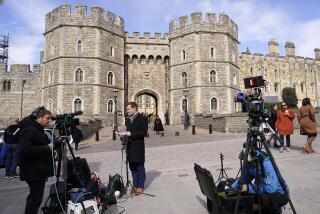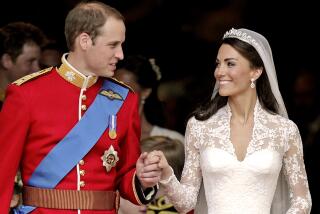Royal wedding likely to be a drag on British economy
Roslynd Hadley is enough of a royalist that she’s happily hosting a garden party Friday to celebrate the much-anticipated marriage of Prince William to his college sweetheart, Kate Middleton.
But Hadley is also enough of a businesswoman to know that, though the wedding may buoy people’s spirits, it’s no boon to her company. Since the British government declared Friday a national holiday in honor of the event, cancellations of bookings for the day have cost her busing firm about $22,000 in lost business.
“I am all for the royal family, but when you’ve got 45 employees to pay and you’re losing that kind of revenue, it is a lot of money,” said Hadley, whose company, Prospect Coaches, is based outside Birmingham.
“We are able to sustain it,” Hadley said of the financial hit, but, “I do feel sorry for the start-ups and the businesses that are still struggling.”
With British flags strung up over busy streets and finishing touches being put on historic Westminster Abbey, where the ceremony will be held, this country is getting ready for its biggest royal wedding since William’s father, Prince Charles, married Lady Diana Spencer 30 years ago.
Journalists and tourists from around the world have flocked to London by the thousands, breathlessly relaying to readers, viewers, and friends and family at home every scrap of wedding-related information they can lay their hands on. (This just in: The napkins at the reception will probably be blue-gray!)
But all the hype about block parties, big champagne orders and wedding kitsch of unspeakable tackiness has obscured a dismaying fact: The royal nuptials are likely to be a drag on Britain’s economy, not a boost. And they’ll cost the public purse a pretty penny at a time of painful government austerity.
The gloomy outlook on the wedding’s economic effects stems largely from the government’s decision to set aside Friday as a public holiday, or “bank holiday” in British parlance.
Every bank holiday costs Britain as much as nearly $10 billion in lost productivity, not an amount to sneeze at when the economy is growing by only 0.5%, according to first-quarter figures released Wednesday. That loss dwarfs whatever gains come from tourism and sales associated with the royal wedding.
Bank holidays are normally fixtures on the calendar that employers can plan for well in advance; most fall on Mondays. Friday’s holiday, however, was announced just five months ago by Prime Minister David Cameron shortly after the royal household revealed the engagement and picked the wedding date.
“Everyone who wants to take part in the celebrations or have a day off and watch the celebrations will be able to do that, and I think that’s absolutely the right thing to do,” a beaming Cameron said at the time. “So we’re all looking forward to the happy day.”
Workers may be delighted by the extra day off, but business owners, especially of small and medium-size firms, have grumbled about the added burden placed on them as they struggle to recover from a brutal recession.
The economic cost of the extra holiday is exacerbated by its timing. Workers just had Friday and Monday off because of Easter; and Monday of next week is a regularly scheduled bank holiday.
Now, Britons are getting, in effect, consecutive four-day weekends, with only three workdays wedged in between. Many people have asked to take those days off as well, realizing that by using just three days of vacation time they can enjoy an uninterrupted 11-day break.
“While the prime minister is right to call on people to have fun, could he not have asked the royal betrothed to pick a Saturday?” the Financial Times asked in an editorial this week, which bore the tagline: “Money can’t buy you love, but love can put you in the red.”
Travel agencies have reported a spike in tour-package bookings outside the country during this extended holiday period, by Brits who either don’t care about the royal wedding or who would rather watch it on TV while sipping cocktails on the French Riviera than throw a viewing party at home and spend money in the British economy.
The exodus of Britons and their wallets will be partially offset by the inflow of visitors, mostly to London, where hundreds of thousands of people are expected to line the wedding procession route or watch the event on giant screens in Hyde Park.
Cash registers are set to ring for hotels, restaurants, tourist attractions and the countless purveyors of “Wills-and-Kate” thimbles, cupcakes, Pez dispensers, coasters, tea towels, barf bags, Halloween masks and commemorative “I Dough” pizzas from fast-food chain Papa John’s, with toppings artfully arranged in a portrait of the happy couple (the bride’s veil is made of mushrooms).
The Center for Retail Research estimates that the royal wedding will generate nearly $700 million in sales. Tourism officials say also that the wedding should enhance Britain as a vacation destination in coming months. Interest in the monarchy, its pageantry and trappings such as castles and crown jewels already brings in an estimated $825 million a year in tourist revenue.
The cost of the wedding itself, to be borne by the royal family with a contribution from the Middletons, is a closely guarded secret. The royal household is said to want to avoid looking too extravagant during an economically delicate time, though it’s a bit of a hard sell when the wedding plans call for young trees to be placed inside Westminster Abbey to create a garden-like ambience, at a reported price of more than $80,000.
And the queen’s subjects aren’t entirely off the hook. Some associated costs will be picked up by taxpayers, such as the massive security operation required for the event, which could cost as much as $33 million.
The outlay of public funds has left some Britons disgruntled as their government embarks on its harshest austerity program in at least a generation. In Liverpool, for example, officials are making $150 million in cuts over the coming year.
Just outside Liverpool, David Bennett runs a small printing company, Betterprint, with 25 workers. He supports the royal family, but the extra bank holiday has meant that business this week is slower than usual.
“We’ve come off the back of a recession. Certainly for our sector we need the country to be knuckling down and getting back to work.... Right now half the country is on ‘go slow,’” Bennett said. “It’s something that, in the end, as a business, we’ll just take it on the chin.”
More to Read
Start your day right
Sign up for Essential California for news, features and recommendations from the L.A. Times and beyond in your inbox six days a week.
You may occasionally receive promotional content from the Los Angeles Times.







